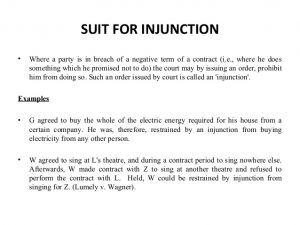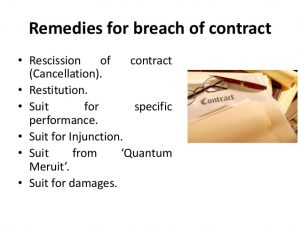Breach of contract for injunction

What is an Injunction?
- Temporary Restraining Order: These are the shortest injunctions that can be issued without a hearing to avoid irreparable harm. These generally have a 10 day time limit.
- Preliminary Injunction: These are generally issued at the beginning stages of a lawsuit and remain enforceable until final judgement is rendered.
- Permanent Injunction: These are usually issued at the end of a trial as part of the judgment order that apply after the lawsuit is over. A preliminary injunction may be converted to a permanent injunction is the plaintiff wins at trial.
A court will usually only award an injunction is the plaintiff has a reasonable chance of success on the merits of the case; there will be irreparable harm if an injunction is not ordered; the hardships are greater for the plaintiff if the injunction is not granted; and granting the injunction is favored by public interest.
When are Injunctions Ordered in Breach of Contract Cases?
Injunctions are frequently awarded in cases involving breach of contract and are often given in lieu of monetary damages. The non-breaching party may even be required to choose between a monetary damages award and an injunction. Some common contract claim injunctions include the following:
- A court may order the breaching party to perform their obligations under the contract. This could include making payments that were outlined under the contract.
- An order may prevent a party from performing a term under the contract, such as selling certain goods to the plaintiff.
- The court may order a breaching party to return goods to the plaintiff if they were not entitled to them under the contract. This could occur in a situation where a shipment contained too many items.
- A court order may require a sale to be carried out according to the contract price, such as with the sale of a home.
- An injunction may prohibit a party from seeking employment with certain companies. This is common in situations where an employee has signed a noncompete agreement.
What Happens if a Party Fails to Follow an Injunction Order?
If a party fails to follow the terms of an injunction order, they will face certain consequences. In a contract case, this will usually be money damages. For example, a party may be fined a set amount of money for each day that they fail to follow the court order. A party could also be held in contempt of court.
How Can You Remove an Injunction?
Injunctions can only be removed by a judge, and sometimes it is removed because it was requested by the person who benefitted from the injunction. However, typically an injunction is removed because it expired, as most injunctions have a timeframe.
Injunctions can last anywhere from as little as two weeks to six months, and it will completely depend on the court’s discretion. As mentioned above, the court will pick the length of time depending on how much protection it will give the plaintiff and how much burden it will put on the defendant.
The defendant can petition to the court if the injunction is too severe. For example, if the defendant is unable to work, due the injunction. How does this happen? If the injunction orders the defendant to stop all production in their factory, in order to stop the production of an item that could potentially violate copyright and trademark laws.
The factory also produces other items, but due to the injunction they cannot produce anything which means that they will not earn any income. This injunction would most likely be considered too harsh, and will be altered or removed.
Equitable Damages
A breach of contract is a common type of civil claim. When a court considers a breach of contract case, the court will almost always award money damages to the innocent party. This means that the breaching party is ordered to pay money to the innocent party to make up for the innocent party’s losses caused by the breach.
Money damages are a legal remedy. A remedy is any court order that imposes a penalty or enforces a right. Though not common, there are remedies other than legal remedies available for breach of contract.
Equitable remedies are those that are based on what is fair, or seems right, in a particular situation. These remedies were historically designed so that they don’t have to follow precedent, or established common laws. Instead, they are purposely intended to be a more flexible option that is used to ensure justice in a particular situation.
These remedies were developed through the old English laws of equity, as used in the historic courts of equity. These courts exclusively granted equitable remedies, and the courts of law granted legal remedies. Eventually, these courts were merged, and legal courts had the authority to grant both types of remedies.
It’s helpful to note that equitable remedies are rarely used. These options are only used in cases where money damages are either too difficult to calculate or are inadequate to remedy the harm done to the innocent party. Let’s take a closer look at the two main equitable remedies available for breach of contract.
Specific Performance
In a breach of contract case, the court can consider ordering specific performance as long as the innocent party asks for that remedy. This equitable remedy orders the breaching party to comply with the terms of the contract. This means that the breaching party will be required to do whatever the party originally promised to do.
The court will consider this option when money damages won’t provide the innocent party with adequate compensation for the breach. Specific performance is most common in sales contracts. This remedy is sometimes used when a sales contract involves something unique, such as a particular tract of land, a rare heirloom, or a priceless art piece.
Specific performance is best understood by considering an example. Let’s say that Arty is an art dealer. He acquires a rare, ancient Egyptian statue that is thought to have belonged to Cleopatra. Andrea collects Egyptian art and makes a sizable offer to buy the piece. Arty agrees, and the two make a valid legal contract.
Arty then decides that he’d rather keep the piece for now. He breaches his contract with Andrea. Andrea sues Arty for breach of contract. The court decides that the piece is truly priceless, and Andrea can’t acquire another comparable piece no matter how much money the court awards her. Instead, the court decides that Arty should comply with the terms of the contract, and sell the piece to Andrea for the price she already agreed to pay. This is specific performance.
Pending a suit, the court can issue an injunction restraining the commission of any act which will involve a breach of the contract. But no injunction can issue when the breach of contract has already been committed. In order to obtain the injunction order, the applicant must satisfy the court that he has a completed contract under which he has acquired a right. An injunction cannot be granted where the contract is not enforceable or when it is illegal. It is an important qualification that a party is not entitled to an order of injunction restraining breach of a contract when he is not going to suffer an irreparable loss, or in other words, is not going to suffer a loss which cannot be compensated in monetary terms. Explanation to s.12 of the Specific Relief Act proclaims that unless the contrary is proved, the court shall presume that the breach of contract to transfer immovable property cannot be adequately relieved by compensation in money. Hence, temporary injunction restraining the breach of such a contract can be passed. No injunction can be issued to restrain breach of a contract which cannot be specifically enforced. Thus a contract of personal service not being specifically enforceable, no injunction can issue to restrain the employer from terminating the service of the employee. In the same way no injunction can issue in respect of a revocable license or a contract of agency. However, breach of a negative covenant, express or implied, in a contract of sale of goods can be restrained by injunction.
Where parties have agreed that a suit relating to certain matter should be brought in a particular court within the country, an injunction may issue to restrain filing the suit in any other court.
Tender and auction
In a suit by the highest bidder for declaration that acceptance of the tender of the bidder quoting lesser amount was illegal and for permanent injunction, the lower court passed an order for maintenance of status quo which was treated to be an order of injunction and the Appellate Division held that the highest bidder had no actionable right to be entitled to an order of injunction. The Appellate Division observed, “Had it been the case that the tender was accepted in violation of a condition which has been mentioned in the tender form, then an argument could be advanced for seeking the protection of the inchoate right of the tenderer.” But in Umme Kawsar v. Shams Corporation the court held that the above observation “did not decide any point, but merely refers to the possibility of raising an argument for protecting such right of a tenderer if he has only been able to prove that some conditions laid down in the tender notice has been violated prior to accepting the same.” In the subsequent case of Mozher Sowdagar v. Zahirul Alam 10 DLR the Appellate Division upheld that order of the High Court Division setting aside the order of temporary injunction stating, “Even if it were the highest offer, he by that offer did not acquire any right t purchase the vessel, as his offer was not accepted by the Corporation which reserved full power to reject offer, and no agreement was concluded with him.” But there has been shift from this position and the Appellate Division upheld the declaration of illegality by the High Court Division at the instance of a tenderer when another tenderer’s bid was held responsive in violation of the tender terms. In similar situation, a tenderer may seek invalidity of the action of the authority inviting tender on the ground of violation of tender terms and press for an order of temporary injunction.
Are There Any Defenses to an Injunction?
The breaching party may sometimes be able to raise a defense if the plaintiff is seeking an injunction against them. This includes the following defenses:
- Unclean Hands: A plaintiff cannot obtain an injunction if they have engaged in similar misconduct as the defendant. Thus, if the plaintiff also breached a contract this defense may be available.
- Laches: This is available when a plaintiff intentionally delays asking the court for an injunction and the delay negatively affects the defendant.
- Hardship: An injunction may not be enforceable if it causes the defendant extreme or undue hardship, such as costing the defendant a large amount of money.

